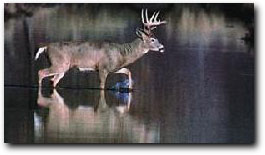Hunting
Choose from the following to find a site:

The USDA-Forest Service and the Minnesota Department of Natural Resources (MnDNR) share responsibility for managing wildlife resources on the Superior National Forest. The MnDNR is the agency responsible for regulating hunting seasons and enforcing game laws. The Forest Service, mainly through timber harvest, is able to contribute to improved habitat conditions, and as such, affect wildlife populations on the forest.
Hunting is allowed on all Superior National Forest lands, including the Boundary Waters Canoe Area Wilderness, except within the limits of developed recreation sites such as campgrounds and boating sites. Hunting on private land within the Forest boundary is allowed only if you have permission from owner of the property. To be sure you are on National Forest land, consult a good land ownership map or your local game warden.
Hunting opportunities on the Forest are varied, ranging from big game animals such as white-tailed deer, and black bear to small game such as grouse and snowshoe hare. In the fall, hunters take to the many lakes, streams, and wetlands located throughout the forest to hunt a variety of waterfowl. Both puddle ducks (mallards, black ducks, wooducks) and diving ducks (scaups, ringbills, goldeney, buffleheads) can be found in fair numbers early in the season. Canada and snow geese are occasional visitors to the Forest as well. Lakes and rivers that have beds of wild rice are particularly attractive to waterfowl.
Please follow Forest Service policies regarding the use of hunting stands and Off-Highway Vehicles. Hunting Stand policies are common to both the Superior and Chippewa National Forests in Minnesota. Hunters also need to be aware that the recently revised Forest Plan includes some new policy regarding Off-Highway Vehicle (OHV) use on Superior National Forest lands.
Camping often is an integral part of the Superior National Forest hunting experience. The Forest has 23 developed campgrounds, 16 rustic campgrounds, as well as a large number of backcountry campsites located inside and outside of the Boundary Waters Canoe Area Wilderness. Most of the developed campgrounds are open year-round, however, regular maintenance is discontinued after the Labor Day weekend.
-
Know Before You Go
Get the most out of your visit by being prepared. Remember you are responsible for your own safety.

